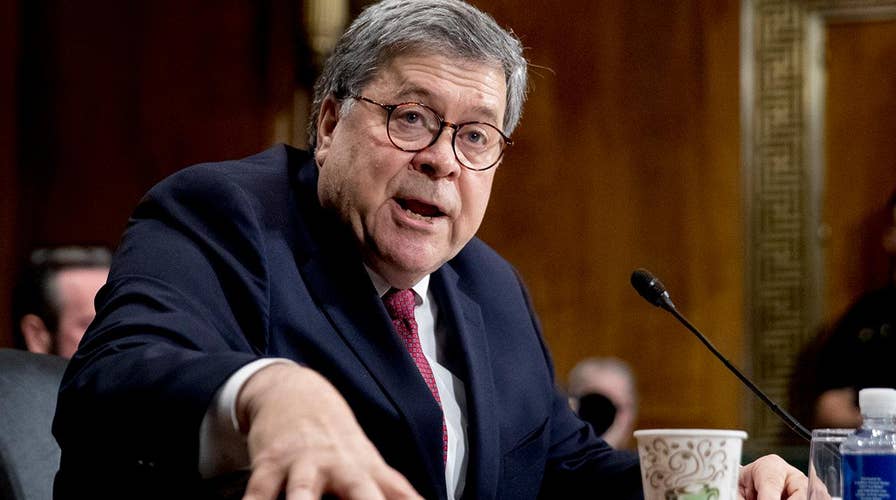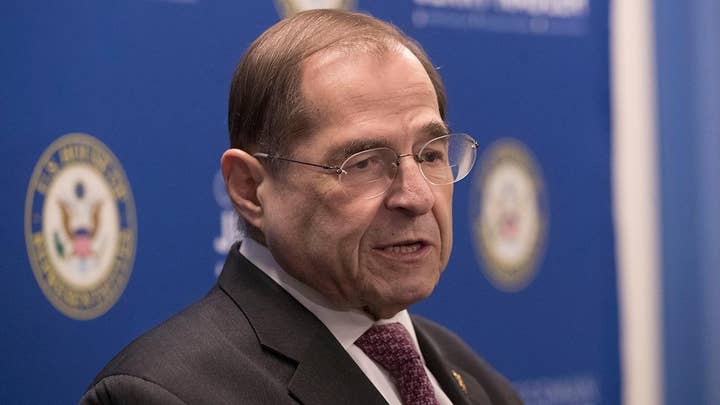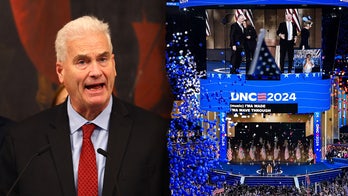Attorney General William Barr grilled by Senators on Capitol Hill during hearing
Texas Rep. Louie Gohmert reacts to the Senate hearing and shares what to expect from the House hearing.
Justice Department officials chided congressional Democrats this week for ignoring a less-redacted version of Special Counsel Robert Mueller’s Russia report made available to them, even as they pursue a subpoena for the full document and accuse the department of stonewalling.
The DOJ released a statement hours after Attorney General William Barr had testified to the Senate Judiciary Committee for more than five hours, answering questions about the department’s handling of the report’s release last month. Along with a letter denying access to the completely unredacted report and other files, the statement said that Democrats, including House Judiciary Chairman Jerry Nadler, D-N.Y., had “refused” so far to review a version of the report with far fewer redactions.
BARR ACCUSES DEMS OF USING CRIMINAL JUSTICE PROCESS AS 'POLITICAL WEAPON' AS HEARING TENSIONS FLARE
“The Attorney General also voluntarily released the Special Counsel’s confidential report with minimal redactions to Congress and the public, made an even-less redacted report available to Chairman Nadler and congressional leadership (which they have refused to review), and made himself available to the Committee by volunteering to testify this week,” spokeswoman Kerri Kupec said.
Democrats had objected to Barr’s decision to transmit the report to Congress with redactions, and Nadler has subpoenaed the full report along with underlying materials. But Assistant Attorney General Stephen Boyd, in the letter to Nadler on Wednesday, said the less-redacted version already available to key members “would permit review of 98.5 percent of the report, including 99.9 percent of Volume II, which discusses the investigation of the President’s actions.”
“Regrettably, before even reviewing the less-redacted version or awaiting the Attorney General’s testimony, you served a subpoena ...” he wrote. “You served such a subpoena knowing that the Department could not lawfully provide the unredacted report, that the Committee lacks any legitimate legislative purpose for seeking the complete investigative files, and that processing your requests would impose a significant burden on the Department.”
One GOP lawmaker said the key section on obstruction in the version that Democrats have ignored contains just four redactions.
Nadler, though, explained Thursday -- at a hearing that Barr was boycotting over the terms of the forum -- that Democrats do not want to see that version because of restrictions placed on viewing it.
He said just a dozen members were allowed to look behind "some but not all" of the redactions, provided they agree not to discuss what they see with colleagues and leave notes behind at the DOJ.
“It is urgent that we see the documents we have subpoenaed, but I cannot agree to conditions that prevent me from discussing the full report with my colleagues, that prevent the House from acting on the full report in any meaningful way.”
His counterpart, ranking member Rep. Doug Collins, R-Ga., fired back that Nadler could always view it and ask for more.
“The chairman won’t even go look at what the attorney general offered him,” he said.
NADLER SLAMS BARR'S DECISION TO SKIP HOUSE HEARING, THREATENS CONTEMPT CITATION
Politico reported Tuesday that only two lawmakers -- Collins and Sen. Lindsey Graham, R-S.C. -- had viewed the less-redacted version, both of whom said that the changes have no bearing on Mueller’s conclusions. Senate Majority Leader Mitch McConnell, R-Ky., was also planning to look at it. Democrats boycotted the less-redacted version, however, saying Barr should provide an unredacted version instead.
Collins, after viewing the report last month, said that the report’s look at the question of potential obstruction “includes only four redactions in total” and reinforces Mueller’s main conclusions that there was no evidence of collusion between the Russians and the Trump campaign, and that there was insufficient evidence to bring an obstruction-of-justice charge against President Trump.
By Wednesday evening, however, the controversy had moved to Barr’s scuttled appearance at the House Judiciary Committee on Thursday. Nadler had demanded that Barr be questioned by committee staff instead of lawmakers -- a request that led Barr to decline to show up.
“Congress and the Executive branch are co-equal branches of government, and each have a constitutional obligation to respect and accommodate one another’s legitimate interests. Chairman Nadler’s insistence on having staff question the Attorney General, a Senate-confirmed Cabinet member, is inappropriate,” Kupec said.
That refusal led Democratic Caucus chairman Hakeem Jeffries, D-N.Y., to promise that Democrats "plan on subpoenaing" Barr "if he decides not to show up."
"He can run but he can’t hide," Jeffries said.
Nadler, meanwhile, accused Barr of trying to “blackmail the committee into not following the most effective means of eliciting the information we need.”
"He is terrified of having to face a skilled attorney,” he said.
Although Barr has not yet been subpoenaed to testify, Nadler said contempt citations could be possible down the road not only if the full Mueller report is not released, but also if Barr does not comply with a possible future subpoena.
Fox News' Jake Gibson and Gregg Re contributed to this report













































